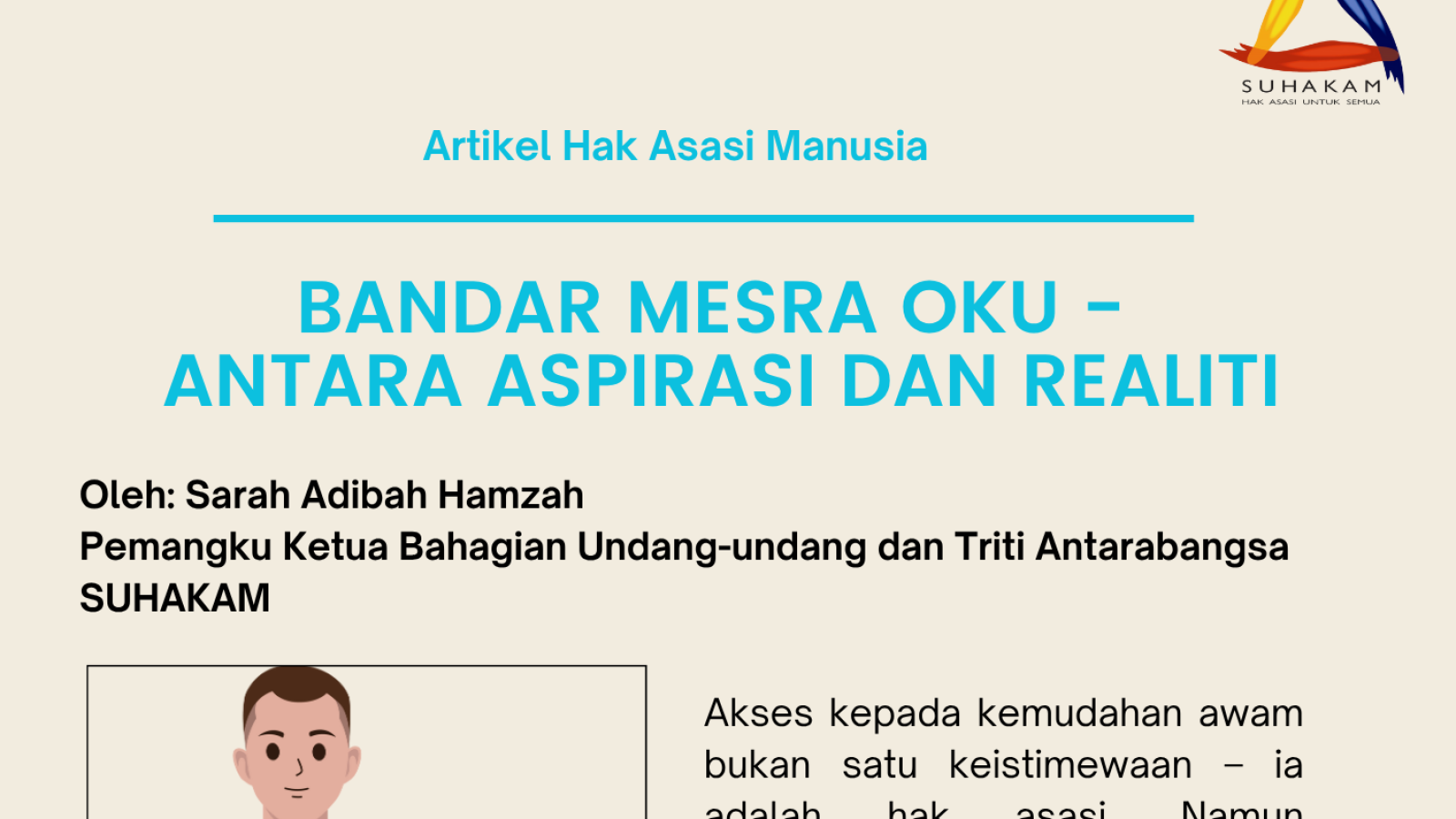KUALA LUMPUR (25 JULY 2025) The Human Rights Commission of Malaysia (SUHAKAM) extends its sincere appreciation to the Government of Malaysia, particularly YB Dato’ Sri Azalina Othman Said, Minister in the Prime Minister’s Department (Law and Institutional Reform), for her continued commitment in ensuring the successful presentation and debate of SUHAKAM’s 2023 Annual Report in the Dewan Rakyat on 24 July 2025.
This marks a significant step forward in strengthening institutional checks and balances and reinforcing the principles of transparency and accountability in public governance. A total of 39 Members of Parliament participated in the debate, raising critical human rights concerns spanning legal frameworks, welfare, social well-being, and institutional integrity.
Among the key issues highlighted were:
- The delay in the appointment of SUHAKAM’s Chairperson and Commissioners, along with proposals to enhance transparency and inclusivity in the selection process.
- Deplorable conditions in lockups and detention centres, including deaths in custody, overcrowding, inadequate medical services, and outdated facilities, such as the continued use of the bucket system in Papar and Miri.
- The continued use of prolonged detention without trial under the Security Offences (Special Measures) Act 2012 (SOSMA), with calls for a moratorium and the establishment of a Special Court to expedite justice.
- Issues relating to Indigenous land rights, with emphasis on the urgent need to recognise and gazette native customary lands.
- Citizenship and statelessness challenges, particularly affecting undocumented children, and the need for mobile registration units by relevant government agencies.
- The socioeconomic rights of vulnerable groups, including gig and e-hailing workers, who remain inadequately protected under current legal frameworks.
- The prevalence of racial, religious, and xenophobic discrimination, which require comprehensive responses through inclusive education and national policies.
- Calls for enhanced implementation of SUHAKAM’s recommendations, including a proposal for the establishment of a Parliamentary Select Committee (PSC) to monitor follow-up actions.
SUHAKAM also acknowledges the constructive responses and commitments from various ministries and agencies on pressing human rights matters. These include efforts to improve access to clean water and public healthcare in remote areas, expand the Custodial Health Unit (CHU) in detention centres, incorporate human rights education aligned with Islamic values, and introduce legal and policy reforms benefiting Indigenous peoples, persons with disabilities (PWDs), and gig economy workers. SUHAKAM further notes Malaysia’s continued support for international humanitarian causes, particularly in relation to Palestine.
The 2023 Annual Report highlights seven core areas of focus:
- The rights of children, women, older persons, PWDs, and Indigenous communities.
- The rights of prisoners and fair detention practices.
- Issues of racial, religious, and hate-based discrimination.
- Economic, social, and cultural rights (ESCR).
- Business and human rights.
- Legal reform and regional as well as international cooperation.
- Institutional reform within SUHAKAM, including the digitalisation of operations.
SUHAKAM wishes to record its special appreciation to YB Senator Dato’ Setia Dr. Haji Mohd Naim bin Haji Mokhtar, Minister in the Prime Minister’s Department (Religious Affairs), for his commitment and support in advancing the discourse on human rights within the Islamic framework. His efforts in promoting inclusive understanding and alignment between maqasid syariah and universal human rights principles are deeply valued.
SUHAKAM expresses its special gratitude to YB Tuan M. Kulasegaran A/L V. Murugeson, Deputy Minister in the Prime Minister’s Department (Law and Institutional Reform), for concluding the debate and for his unwavering dedication to advancing the human rights agenda for the benefit of all Malaysians.
SUHAKAM reiterates that political will is essential, not only to table the Annual Report but to meaningfully debate and to take necessary actions on the issues raised. The report serves as a platform for Parliament and all stakeholders to express concerns, share insights, and most importantly, drive tangible actions by relevant government agencies in implementing SUHAKAM’s recommendations.
Human rights are fundamentally revolving around dignity, equality, and accountability. SUHAKAM stresses that the Annual Report is not merely a procedural requirement, but a vital accountability mechanism to assess national progress in upholding human rights.
SUHAKAM welcomes continued collaboration with the Government, Parliament, civil society, and the private sector to ensure that the rights of all individuals in Malaysia are respected, protected, and fulfilled.
For more information and to read the full SUHAKAM 2023 Annual Report, the public is invited to visit SUHAKAM’s official website at: https://suhakam.org.my/wp-content/uploads/2025/07/Laporan-Tahunan-2023-SUHAKAM.pdf
-TAMAT-
The Human Rights Commission of Malaysia (SUHAKAM)
Date: 25 JULY 2025














